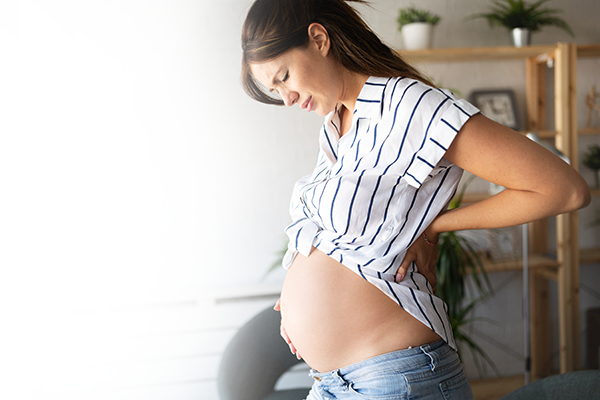Bloating during pregnancy is one of the most common complaints during this time. Its cause is the accumulation of gas in the intestines. Pregnant women are more prone to this due to hormonal changes that affect the digestive process. Bloating during pregnancy can be treated with short-term remedies from the pharmacy. Physical activity is also an effective remedy.
A bloated belly during pregnancy is a normal phenomenon. However, the problem arises when the accumulation of gas is accompanied by other, more concerning symptoms. These include vomiting or diarrhea, which can lead to dehydration. In such cases, a visit to the doctor is advisable. Here we provide tips on how to manage unwanted gas and what is safe and effective for both mother and baby when it comes to relieving bloating during pregnancy.
Where does bloating in pregnancy come from?
Bloating during pregnancy is a widespread phenomenon because hormonal changes in the woman’s body cause the digestive system to work more slowly. As a result, food is processed more slowly, and the faster it is eaten, the more gas accumulates in the stomach. A bloated belly in pregnancy can also be caused by swallowing air while eating and by constant constipation. Constipation, eating too quickly, and hormonal fluctuations are not the only factors that cause bloating during pregnancy. Poor eating habits and lack of exercise also contribute to the discomfort. Consuming large amounts of fatty foods or, even worse, legumes, can intensify the unpleasant symptoms.
Bloating during pregnancy – accompanying symptoms
Painful bloating during pregnancy can be easily recognized as the characteristic symptoms are a hard belly and pain, which may radiate to other parts of the body. However, the accompanying symptoms of gas accumulation become problematic, as they can cause concern and often require a visit to a specialist. These symptoms include nausea, heartburn, and vomiting, which can lead to dehydration. Persistent bloating during pregnancy should be discussed with a doctor, especially if the expectant mother complains of weakness and general discomfort.
How to deal with bloating during pregnancy?
Bloating during pregnancy rarely requires typical pharmacological treatment. It can be managed with home remedies or short-term over-the-counter preparations. A measure that can provide relief is changing eating habits, avoiding fatty and hard-to-digest foods, and avoiding gas-producing foods. Some physical activity can also help.
The simplest method for dealing with bloating at the beginning of pregnancy and later on is the use of gentle medications from the pharmacy:
- Simethicone – Available in drops and capsule form, it quickly eliminates gas in the abdominal area by dissolving air bubbles in the intestines.
- Fennel – Promotes the release of accumulated gas through its carminative effect and also aids digestion.
- Chamomile – Has anti-inflammatory and soothing effects on the digestive system. It also has antispasmodic properties, which relieve bloating and the pain caused by it. Chamomile is available as tea leaves, herbal infusions, or in tablet form.
- Caraway – Although it has a distinct taste and smell, it works very well on the digestive system. Caraway speeds up the digestive process, preventing excessive gas accumulation.
Herbal mixtures are also available in pharmacies that have antispasmodic effects and eliminate gas from the abdominal area. However, one should read the ingredients of these herbs, as many of them should not be used during pregnancy, as they could affect the course of the pregnancy. If bloating persists despite using short-term remedies, a doctor should be consulted.










